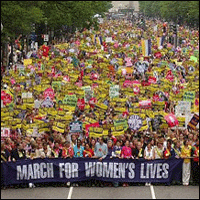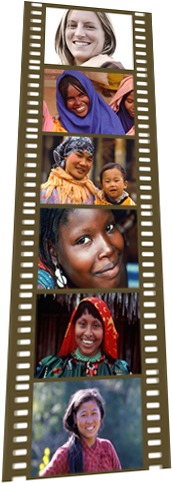
Courtesy of IWD
International Women’s Day has been observed since in the early 1900’s, a time of great expansion and turbulence in the industrialized world that saw booming population growth and the rise of radical ideologies. In 1908, women’s oppression and inequality was spurring women to become more vocal and active in campaigning for change. 15,000 women marched through New York City demanding shorter hours, better pay and voting rights. In 1909, the Socialist Party of America declared the first National Woman’s Day (NWD) and it was to be observed across the United States on February 28. Women continued to celebrate NWD on the last Sunday of February until 1913 when IWD was transferred to March 8.
IWD is now an official holiday in China, Armenia, Russia, Azerbaijan, Belarus, Bulgaria, Kazakhstan, Kyrgyzstan, Macedonia, Moldova, Mongolia, Tajikistan, Ukraine, Uzbekistan and Vietnam. The tradition sees men honoring their mothers, wives, girlfriends, colleagues, etc with flowers and small gifts. In some countries IWD has the equivalent status of Mother’s Day where children give small presents to their mothers and grandmothers.
President Obama gives recognition to International Women’s Day
Crediting their role in the American story, President Barack Obama on Monday praised the nation’s “daring, indomitable” women — including the one-time political rival who is now his secretary of state. Obama praised Clinton for her long-standing work on women’s rights. Furthermore, President Obama said, “we’re doing all of this not only because promoting women’s empowerment is one of the best ways to promote economic development and economic success. We are doing it because it’s the right thing to do. I say that not only as a president, but also as the father of two daughters, as a son and a grandson, and as a husband.”
This week, Global Washington would like to honor International Women’s Day by showcasing our members that are advocating women’s and girl’s rights around the world:
One in Three Women Campaign has a bold vision: A World Where Women and Girls Are Safe

Courtesy of Americans for UNFPA
from Violence in Their Homes and Communities. One in Three Women is a simple yet powerful message. It is the statistic used in the 2003 United Nations Women’s Development Fund’s (UNIFEM) report on violence against women worldwide. One in Three Women in the world will be raped, beaten, sexually coerced, trafficked or otherwise abused in her lifetime.
One in Three Women brings attention to a long-running pandemic that is a culturally ingrained oppression. The organization is about the prevalence of violence against women globally; that prevalence is the campaign cornerstone. The United Nations Women’s Development Fund (UNIFEM) firmly calls for more governmental intervention against the global problem of violence against women. As the longest, most pervasive and one of most dangerous forms of oppression, gender violence continues at an alarming rate. One in Three Women globally will be affected by violence because of her gender.
UNFPA, the United Nations Population Fund, is an international development agency that promotes the right of every woman, man and child to enjoy a life of health and equal opportunity. UNFPA supports countries in using population data for policies and programs to reduce poverty and to ensure that every pregnancy is wanted, every birth is safe, every young person is free of HIV/AIDS, and every girl and woman is treated with dignity and respect. They build moral, political and financial support within the United States for UNFPA. UNFPA, the United Nations Population Fund, provides women’s health and promotes the rights of women in 150 countries. It is the largest international source of such assistance. Americans for UNFPA’s outreach has generated tens of thousands of supporters for global women’s health and channeled their passion into advocacy on behalf of UNFPA’s program.
Bahia Street breaks cycles of poverty and violence through quality education for impoverished girls and young women living in Salvador, Brazil. Globally, Bahia Street brings people from all backgrounds together for discussions and actions that promote equality. Founded in 1997, Bahia Street is registered as a non-profit organization in Brazil, the United States, and the United Kingdom. The infrastructure of Bahia Street is a partnership that combines the knowledge and dedication of a grassroots organization with the accountability and financial strength of an international one.
The Bo M. Karlsson Foundation believes that by helping one individual at a time, they can make a positive change in the world and have a meaningful connection with that individual. The women they support awaken us to our global connectivity and the universal desire for peace and goodwill. The rippling effect is monumental. As the Bo M. Karlsson Foundation support women in their educational pursuits, their desire is that this also helps them build character and strength, making them self-reliant, confident, and productive citizens in their own country.
Mona Foundation is a 501 (c) (3) nonprofit organization dedicated to supporting grassroots educational initiatives and raising the status of women and girls worldwide. Mona Foundation serves its mission through development of human resources, promoting service learning and volunteerism, bridging the digital divide and supporting their adopted projects through financial grants and material resources that these projects need for their everyday operation or for their development plans.
Smiles Forever is an American and Bolivian non-profit foundation that works to give opportunity to young indigenous women in Bolivia and to improve the overall oral health of the communities in which they live. The students of Smiles Forever are taught the importance of serving their communities through community service work, which represents a large part of Smiles Forever’s educational program. Their students are also leading the way in introducing the profession of dental hygiene to Bolivia, where as of yet it does not exist.
HEAL Africa’s hospital and community development work address the root causes of illness and poverty for the people of eastern Democratic Republic of Congo. The hospital and the 28 women’s houses in Maniema and North Kivu have provided a safe place for many victims of the war, and have been a motor for combating poverty and promoting community cohesion over the past 14 years.
Women’s Enterprises International
Women’s Enterprises International is dedicated to creating opportunities that equip women in developing countries to overcome poverty and transform their lives and communities. They do this by partnering with indigenous women’s groups in development projects that provide solutions to three systemic causes of poverty; lack of access to water, lack of access to business capital and limited access to education for girls.
USAID Policy News:
USAID Sends Assistance in Response to Chile Earthquake
In response to the earthquake in Chile the U.S. Agency for International Development (USAID) has provided $1 million to the International Federation of the Red Cross (IFRC), to help with emergency assistance needs. In addition, USAID is providing shelter material and mobile water treatment units to assist the people of Chile.
USAID is asking Congress for supplemental emergency funding for disaster relief, after much of its International Disaster Assistance fund has been spent on Haiti.
USAID Administrator Rajiv Shah testified before Congress last week to defend the President’s budget request for international development. The Center for Global Development analyzes his testimony and assesses his first couple of months on the job.